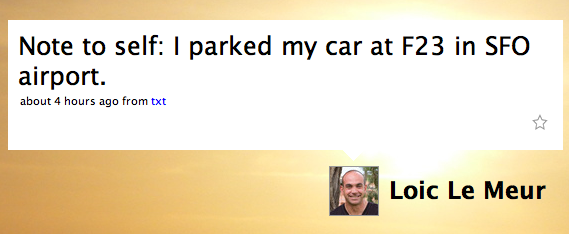Implications of Twitter: Crime 2.0
Sept. 30, 2008. White man about 20 years of age, wearing a blue shirt, yellow vest, safety goggle and a respirator mask. An ordinary road-worker going to work you might think. No you’re wrong, this is the story of a genius robber who used Craiglist to recruit a dozen of people to act as decoys while he robbed an armored security truck. The decoys were told to show up for work at a certain place in front of the bank and wear a yellow vest, safety goggles and a respirator mask. After the robbery, the entire street was full of people who fit the description of the perpetrator who could flee without getting caught. So criminals are monitoring and using social media now. I didn’t read of any Twitter crimes yet. Could Twitter be the next target of crime 2.0?
The micro blogging networking website is a great way to keep in touch with your friends, follow your favorite stars or receive regular updates from products you use. By updating your status you can tweet to all your followers informing them instantly of your feelings, location or findings on the web.
Twitter is not only about power to the people , but also about space and time. In this post I’ll closely look at one of the implications of re-defining space and time in Twitter. I argue that we move away from the space and time notion of Manuel Castell and go to a more open notion of space and time. Where we constantly (re)defining our whereabouts.
Castells argues that we are moving from the industrial age to the information age. The new information age promotes new forms of social time and space: space of flows, timeless time, placeless space. Space of flows is the base for real virtuality. Real virtuality, as Castells states, is characterized by timeless time and placeless space [1]. He states that communications technologies allow for the annihilation of space and for globalization; the potential for rapid and asynchronous communication also changes the relationship to time[2]. I agree with Mansell when he states that people are limited to places and power isn’t. But I think that – if we look closely to Twitter – we, as users of Twitter, are pulling away from his argument of total annihilation of space and time and do the opposite. We are re-defining our notion of space and time even we are not aware of it. Every time we post a tweet on Twitter about our location (Time is always mentioned in a tweet) we re-define our being, our location and our time to others. The technology allows us to share anything we want, so we do that. But this re-defining process, as I called it, could have some serious practical implications.
For instance, people make tweets about where they explicitly are and what they do. If thieves follow your tweets this form of life casting give them a brilliant opportunity to have a ‘look’ in your house.

Another implication could be privacy on Twitter. There are some new initiatives in the USA were neighborhood watches are using Twitter, blogs, e-mail and street patrols to help ward off crime. One tweet for example: resident last August: “black male dark glasses blue cap baggy jeans yellow/black umbrella ‘wrong address.’ Now in neighor’s yard.”
I’m not going to deep into this topic but initiatives like above could have some serious privacy implications. “You have the right to observe what’s going on in the street, but that doesn’t give you a right to go peer in your neighbor’s window”, states Carrie Davis, staff council for the American Civil Liberties Union.
So what do we do if Twitter is the next victim of crime 2.0? Do we have to live in fear what happens? Stay home, unplug and lock the doors? May be the recommendations in my latest article (link) could help Twitter(users)?
[1] Castells, M, The Rise of the Network Society, The Information Age: Economy, Society and Culture, Vol. I. Cambridge, MA; Oxford, UK: Blackwell, 1996: 464
[2] Castells, M. Materials for an exploratory theory of the network society. British Journal of Sociology Vol. No. 51 Issue No. 1 (January/March 2000) pp. 5-24.